A Review of IDPRSP at Sinapi Aba Ghana, by CapitalPlus Exchange (CapPlus) November 2016
Our partners at CapPlus completed a review of the IDPRSP, focusing on our strong partnership with Sinapi Aba and evaluating whether the program demonstrates that commercial financial institutions can sustainably lend to low-fee private schools. The review found five key indicators of success:
- A strong partnership between Sinapi Aba and IDPF
- The proprietor training has been well-received and sought out by LFPS proprietors
- A productive/reasonable relationship with the Ghanaian government
- A lending model that combines the distribution of loans with training
- The program is financially viable and is sustainable even with the added expense of training

